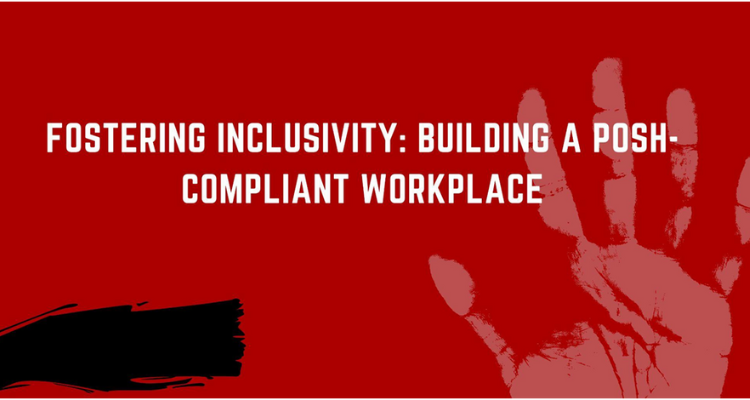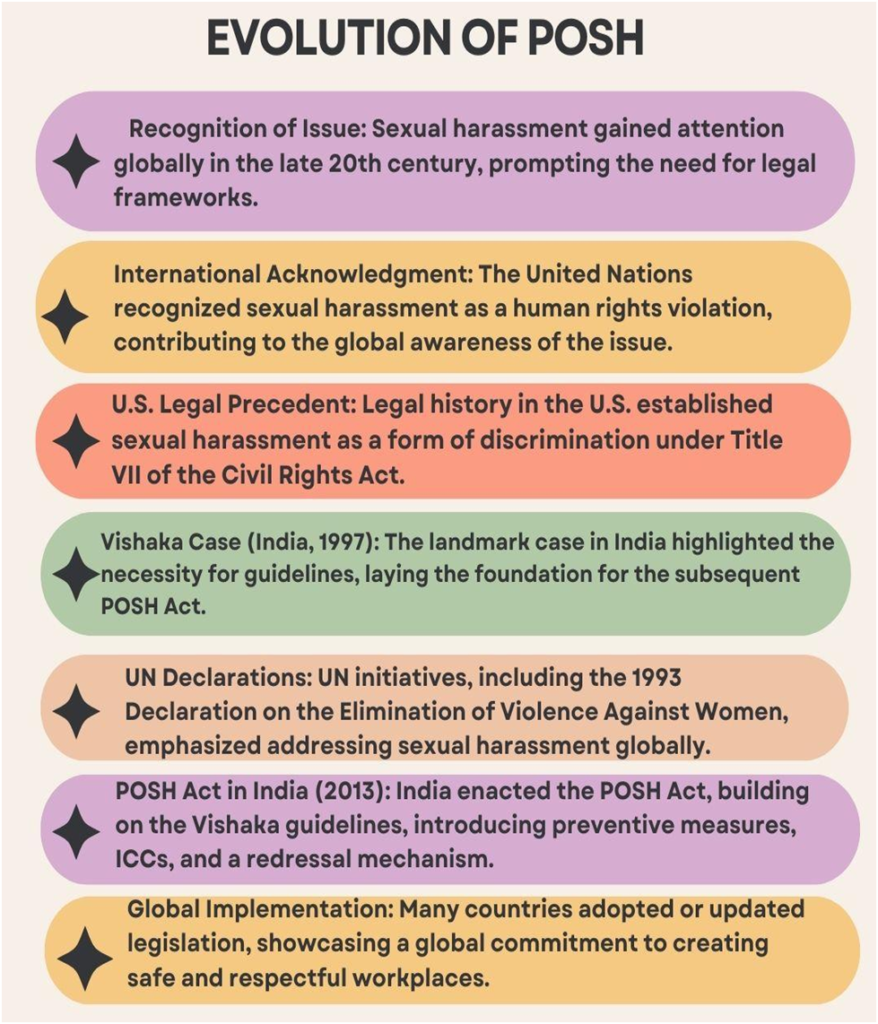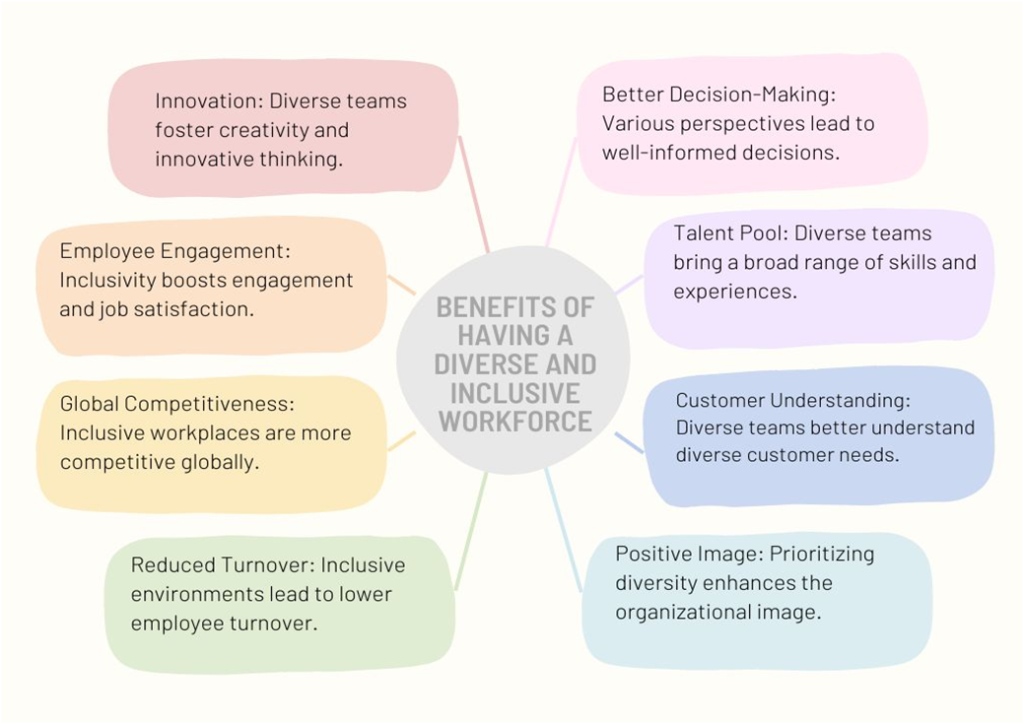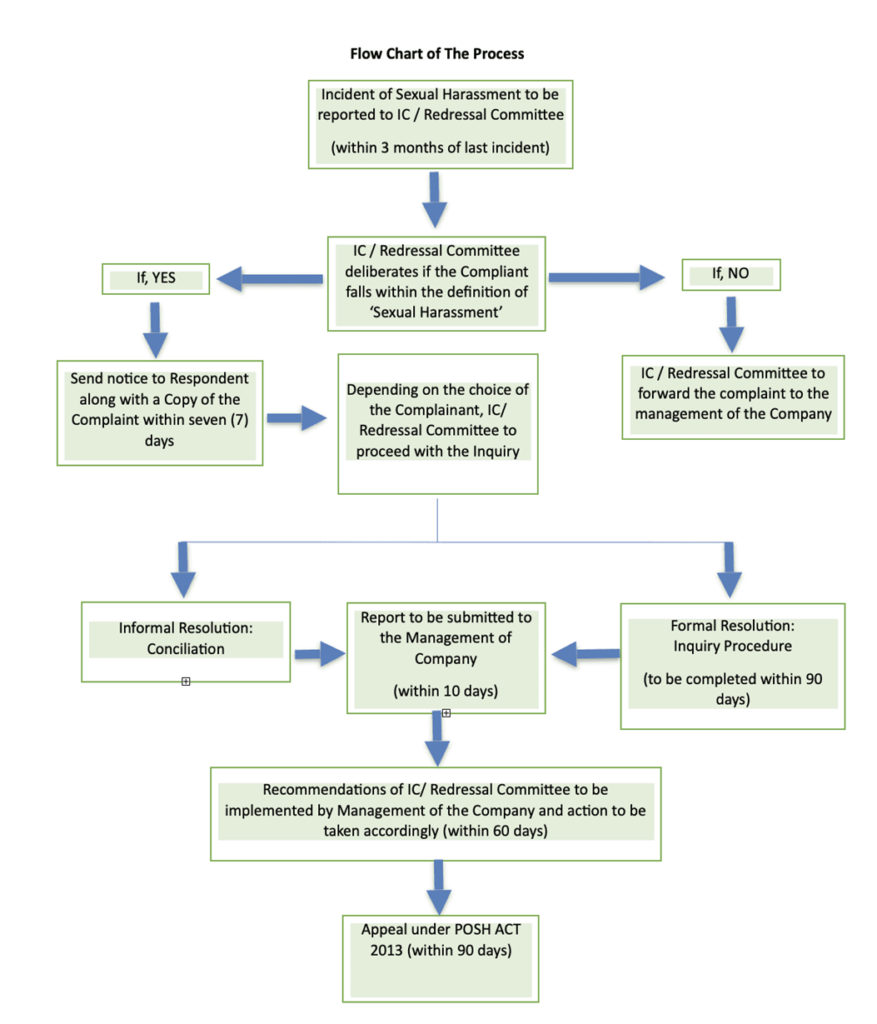Building workplace inclusivity is fundamental for innovation, engagement, and collaborative success—essential elements for sustained achievement. Embracing diversity not only enhances our teams but also drives us toward a future where every voice holds value and resonance. Building a POSH Culture and thereby creating a workplace environment that is inclusive and respectful of all individuals is not just a legal obligation but a moral imperative.
In recent years, there has been a growing emphasis on fostering inclusivity in the workplace, ensuring that every employee feels valued, respected, and empowered to contribute their best. One crucial aspect of this endeavor is ensuring compliance with POSH (Prevention of Sexual Harassment) regulations. In this blog, we delve into the importance of fostering inclusivity and discuss practical strategies for building a POSH-compliant workplace that promotes a culture of respect, dignity, and equality for all.
Understanding POSH | Building a POSH Culture
POSH, or Prevention of Sexual Harassment, is a framework aimed at ensuring a safe workplace. It involves guidelines and legal measures to prevent and address incidents of sexual harassment. For instance, a company might implement mandatory training sessions on respectful behavior and create a confidential reporting system to uphold POSH principles, fostering a culture of respect, well-being, and safety among employees.
The objective of POSH policy
Importance of fostering inclusivity in the workplace
Fostering inclusivity in the workplace is essential as it cultivates an environment where every individual, regardless of their background or characteristics, feels valued, respected, and included. This is crucial for several reasons:
- Enhanced Diversity: Inclusivity promotes a diverse workforce by welcoming people with various perspectives, experiences, and skills. This diversity contributes to creativity, innovation, and more comprehensive problem-solving.
- Increased Employee Engagement: When employees feel included and appreciated, their engagement levels rise. Inclusive workplaces encourage a sense of belonging, leading to higher job satisfaction and commitment.
- Attracting and Retaining Talent: Organizations that prioritize inclusivity attract a broader range of talent. Moreover, inclusive cultures contribute to higher employee retention rates as individuals are more likely to stay in environments where they feel accepted and supported.
- Improved Team Performance: Inclusive teams benefit from improved collaboration and communication. When individuals feel comfortable expressing themselves, it fosters a positive working atmosphere, leading to enhanced overall team performance.
- Innovation and Adaptability: Inclusive environments encourage a variety of perspectives, fostering innovation and adaptability. Different viewpoints contribute to more creative problem-solving and a better ability to navigate change.
- Compliance and Reputation: Fostering inclusivity aligns with legal and ethical standards, ensuring compliance with regulations. Additionally, companies that prioritize inclusivity tend to build positive reputations, attracting customers and partners who value diversity.
- Global Competitiveness: In an interconnected world, inclusive workplaces are better positioned to understand and engage with diverse markets. This enhances a company’s competitiveness on a global scale.
- Reduced Conflict and Improved Well-being: Inclusive workplaces tend to have lower levels of conflict as employees respect and appreciate each other’s differences. This positive environment contributes to overall employee well-being.
Evolution of POSH
Understanding Inclusivity
Concept of inclusivity and its impact on workplace culture
In the professional realm, inclusivity is a guiding principle that surpasses the mere acceptance of diversity. It involves creating an environment where each individual, regardless of their background or identity, is not only tolerated but actively embraced and valued. This philosophy encourages a workplace culture that recognizes and appreciates the unique contributions of every team member.
| Cultural Impact | Key Aspects |
| Elevated Employee Morale | Positive atmosphere, acknowledgment, and value lead to heightened motivation and engagement. |
| Facilitated Collaboration | Inclusivity encourages open communication, fostering a dynamic and innovative workplace through shared ideas. |
| Embracing Diverse Perspectives | Celebration of diversity provides a range of viewpoints, enhancing creative problem-solving and decision-making. |
| Increased Productivity | A sense of belonging drives heightened commitment, resulting in increased productivity for team and organizational success. |
| Diminished Turnover Rates | Inclusive environments correlate with lower turnover, reducing costs associated with recruitment and training. |
| Positive Employer Image | Prioritizing inclusivity contributes to a positive employer brand, attracting diverse talent and enhancing the organization’s image. |
| Adaptability to Change | Inclusive cultures promote adaptability, with supported and included employees embracing change positively. |
| Alignment with Organizational Values | Inclusive cultures align with contemporary values, reinforcing organizational identity and resonating positively with stakeholders. |
Benefits of having a diverse and inclusive workforce
Introduction to POSH Compliance
POSH, or Prevention of Sexual Harassment, comprises a comprehensive set of guidelines and legal measures strategically designed to establish a secure and respectful workplace environment. This framework is pivotal in addressing and preventing incidents of sexual harassment within professional settings.
What is POSH compliance and why it is crucial for creating a safe work environment
POSH compliance stands as a cornerstone for cultivating a safe work environment, emphasizing the importance of protection against sexual harassment for every employee, irrespective of gender. By instilling a culture of respect, POSH not only safeguards individual well-being but also contributes to the creation of a workplace characterized by dignity and professionalism.
Legal framework and requirements for POSH compliance
| Aspect | Details |
| Legislation | Mandated by the Sexual Harassment of Women at Workplace (Prevention, Prohibition, and Redressal) Act, 2013. |
| Internal Complaints Committees | Organizations must establish ICCs dedicated to addressing and resolving harassment complaints. |
| Complaint Procedures | Clearly defined procedures for submitting, investigating, and resolving harassment complaints. |
| Training Programs | Employers are obligated to conduct awareness and training programs, educating employees on POSH compliance. |
| Reporting Mechanisms | Implementation of effective and confidential reporting channels accessible to all employees. |
| Prevention Measures | Proactive measures, including awareness campaigns, aimed at preventing incidents of sexual harassment. |
| Legal Consequences | Non-compliance may result in legal penalties and damage to the organizational reputation. |
| Periodic Compliance Reporting | Organizations are often required to submit periodic reports showcasing their adherence to POSH compliance. |
| Non-Discrimination Policies | Encouragement to adopt policies promoting a broader culture of non-discrimination and workplace equality. |
| Continuous Compliance Monitoring | Regular reviews and updates to ensure continuous alignment with evolving legal standards and organizational needs. |
Steps to Build a POSH-Compliant Wokculture
Step-by-step guide on implementing POSH compliance in the workplace
- Understand Legal Requirements: Develop a comprehensive understanding of legal guidelines related to preventing sexual harassment.
- Establish an Internal Complaints Committee (ICC): Form an ICC with diverse representation to impartially handle complaints.
- Craft a POSH Policy: Develop a thorough POSH policy that articulates the organization’s commitment to preventing and addressing sexual harassment.
- Conduct Awareness Training: Provide consistent training to all employees to enhance awareness about preventing harassment and fostering a respectful workplace.
- Implement Confidential Reporting Channels: Establish accessible and confidential reporting mechanisms to encourage incident reporting without fear.
- Ensure Transparent Investigation Procedures: Establish clear and transparent processes for investigating complaints, ensuring fairness and impartiality.
- Take Prompt Action: Address reported incidents promptly and impartially, reinforcing the organization’s dedication to a secure workplace.
- Conduct Regular Compliance Audits: Periodically evaluate the organization’s adherence to POSH guidelines and make necessary adjustments for ongoing compliance.
- Foster a Supportive Culture: Cultivate a workplace culture that promotes openness and support, encouraging employees to feel at ease when reporting incidents.
- Promote Non-Retaliation: Emphasize protection against retaliation for individuals reporting incidents, fostering an environment where speaking up is encouraged.
- Leadership Development: Provide leaders with training on promoting respect, inclusivity, and understanding their role in preventing harassment.
- Enforce Leadership Accountability: Integrate POSH compliance into leadership performance evaluations, highlighting their crucial role in maintaining a safe workplace.
- Effective Communication and Awareness: Regularly communicate POSH policies and updates to ensure universal awareness of guidelines and procedures.
- Consider External Guidance: Periodically seek external reviews or guidance to ensure alignment with best practices and evolving standards in the prevention of sexual harassment.
Interview with POSH Expert – Ms. Vasanthakumari Jayaraman
Role of leadership in fostering a culture of respect and inclusivity
Leaders play a crucial role in fostering a culture of respect and inclusivity in the workplace through the following key actions:
- Setting a Positive Example: Leaders establish a positive example by embodying exemplary behavior, serving as role models for the entire organization.
- Active Communication and Training Engagement: Actively communicating organizational values and participating in training initiatives underscores the significance of respect and inclusivity.
- Accessibility and Supportive Environment: Creating an approachable environment, leaders encourage employees to feel at ease reporting incidents and seeking necessary support.
- Ensuring Accountability: Leaders are held accountable for maintaining a workplace that upholds respect, inclusivity, and adherence to established policies.
- Inclusive Decision-Making: Leaders involve diverse perspectives in decision-making processes, ensuring a comprehensive representation of voices in organizational choices.
- Support for Internal Complaints Committee (ICC): Extending full support to the Internal Complaints Committee emphasizes the organization’s commitment to addressing and resolving complaints.
- Advocacy for Diversity: Actively advocating for diversity in leadership roles reinforces the commitment to creating an inclusive representation reflective of the organization’s workforce.
What is Internal Complaints Committee (ICC)
The Internal Complaints Committee (ICC) is a necessary entity established in organizations to handle complaints related to workplace sexual harassment. Its primary role is to offer a fair and impartial platform for individuals who have encountered or witnessed sexual harassment to report incidents and seek resolution.
Structure of Internal Complaints Committee (ICC)
Composition: The ICC typically consists of internal and external members, with a minimum of four members, including at least one external expert on sexual harassment or a woman activist. Diverse representation is sought for impartiality.
To know more about Internal Complaints Committee (ICC) Click here
Key aspects of the Internal Complaints Committee (ICC)
Roles and Responsibilities
- Receiving Complaints: The ICC is tasked with receiving and recording complaints of sexual harassment from employees.
- Conducting Investigations: Thorough and impartial investigations are conducted by the committee, ensuring a fair and just process.
- Providing a Platform: The ICC offers a platform for complainants to voice their grievances, ensuring confidentiality throughout the process.
- Recommend Actions: Following investigations, the committee suggests appropriate actions or measures to address and resolve the complaint.
- Confidentiality: Maintaining confidentiality is crucial for the ICC, ensuring the protection of the complainant’s identity and other involved parties to the extent possible.
- Awareness and Training: The ICC contributes to creating awareness about the organization’s policies on sexual harassment, conducting periodic training for employees to understand their rights and the complaint resolution process.
- Compliance: Operating in accordance with relevant laws and guidelines, such as the Sexual Harassment of Women at Workplace (Prevention, Prohibition, and Redressal) Act in India, is a priority for the ICC.
- Documentation: Detailed documentation of complaints, investigations, and actions taken is maintained by the committee, ensuring a transparent and accountable process.
Training and Awareness Programs
Importance of Conducting POSH Training in Organizations
| Key Aspect | Description |
| Ensuring Legal Compliance | POSH training is crucial for organizations to adhere to legal mandates, specifically the Sexual Harassment of Women at Workplace (Prevention, Prohibition, and Redressal) Act. |
| Enhancing Awareness | Training cultivates awareness among employees, fostering a deeper understanding of the definition of sexual harassment and unacceptable conduct. |
| Fostering a Safe Environment | POSH training actively contributes to creating a secure and respectful work atmosphere by educating employees on identifying and preventing sexual harassment. |
| Empowering Employees | Through training, employees gain empowerment to recognize inappropriate behavior, encouraging reporting and contributing to a harassment-free workplace. |
| Demonstrating Organizational Dedication | Providing POSH training serves as a tangible demonstration of an organization’s dedication to its workforce’s well-being and its unwavering stance against sexual harassment. |
How to become a POSH Trainer?
Optimal Timing for POSH Training
| Training Approach | Description |
| Incorporation into Onboarding | Integrate POSH training into the onboarding process for new hires, setting clear expectations from the commencement of their employment. |
| Annual Reinforcement Sessions | Conduct annual refresher courses to reinforce awareness, update employees on policy changes, and maintain a consistent understanding. |
| Alignment with Events | Schedule training events around relevant occasions, such as Women’s History Month, or during awareness campaigns to maximize impact. |
| Immediate Response to Incidents | Provide immediate training to employees involved in or witnessing a sexual harassment incident as part of the resolution process. |
Effective Approaches to Conducting POSH Training
- Online Interactive Modules: Develop engaging online modules with quizzes to ensure comprehension and accessibility at employees’ convenience.
- Live Workshops and Seminars: Organize in-person workshops or seminars led by experts to facilitate open discussions and address specific concerns directly.
- Role-Playing Exercises: Incorporate role-playing exercises, allowing employees to practice responding to and reporting incidents within a controlled environment.
- Utilization of Case Studies: Use real or fictional case studies to illustrate various scenarios, enhancing practical understanding and application.
- Interactive Webinars: Arrange live webinars with Q&A sessions to foster engagement and allow employees to interact with trainers, addressing individual queries.
- Anonymous Reporting Channels: Ensure the availability of anonymous reporting channels for employees uncomfortable discussing issues openly.
- Leadership Engagement: Include leadership involvement in training sessions, demonstrating a commitment to prevention and awareness from top management.
- Recognition Programs: Implement recognition initiatives for employees contributing to a POSH-compliant workplace.
Learn more Posh Policy and Why Posh Training mandatory
Implementing diverse and consistent approaches to POSH training ensures continual awareness, compliance, and the cultivation of a culture emphasizing respect and safety within the organization.
Reporting Mechanisms and Support Systems
Flow chart of the Reporting Mechanisms
Establishment of confidential reporting mechanisms for harassment incidents
- Anonymous Hotlines and Helplines: Implement anonymous hotlines or helplines for confidential reporting, prioritizing the protection of the reporter’s identity.
- Dedicated Email Addresses: Create confidential email addresses solely for reporting harassment incidents, ensuring discreet submission of information.
- Online Reporting Portals: Set up secure online portals with encryption features, providing a confidential channel for reporting incidents.
- Third-Party Reporting Platforms: Collaborate with third-party reporting platforms to add an extra layer of confidentiality for external reporting.
- Designated Personnel: Appoint trained individuals within the organization to receive confidential reports directly, maintaining a confidential communication channel.
- Posters and Communication Materials: Display informational materials in common areas highlighting reporting mechanisms, stressing confidentiality and anonymity.
Support systems in place for victims and the importance of creating a safe reporting environment
- Employee Assistance Programs (EAPs): Establish EAPs offering counseling and mental health support for harassment victims. Legal Assistance and Advocacy: Provide access to legal assistance and advocacy services to ensure victims are informed about their rights and options.
- Medical Support: Facilitate access to medical support, including counseling and examinations, prioritizing the well-being of victims.
- Temporary Protective Measures: Implement temporary protective measures, such as reassignment or leave, to guarantee the safety of victims during investigations.
- Awareness and Training for Support Personnel: Train HR professionals and managers on handling harassment cases sensitively and offering appropriate support to victims.
- Clear Reporting Procedures: Clearly communicate reporting procedures and available support, ensuring victims are aware of the steps involved and the assistance accessible to them.
- Confidentiality Assurance: Emphasize the paramount importance of maintaining confidentiality throughout the reporting and investigative processes, fostering trust in victims.
- Non-Retaliation Policies: Enforce non-retaliation policies to shield victims from adverse consequences for reporting incidents.
- Crisis Intervention Teams: Establish crisis intervention teams capable of swift responses to harassment incidents, offering immediate support and guidance. Continuous Monitoring and Improvement: Regularly monitor the effectiveness of support systems, gather feedback, and make ongoing improvements to guarantee timely and empathetic assistance to victims.
Best Practices for creating an inclusive and POSH-compliant workplace
Implementing a workplace that is both inclusive and compliant with Prevention of Sexual Harassment (POSH) regulations involves adopting effective strategies. Here are key practices to achieve this
- Define Clear Policies: Develop and communicate comprehensive policies on inclusivity and POSH compliance, outlining expected behaviors and consequences for violations.
- Employee Training Sessions: Regularly conduct training on diversity, inclusivity, and POSH guidelines to ensure awareness and understanding among all employees.
- Form a Robust Internal Complaints Committee (ICC): Establish an ICC with diverse representation to handle complaints impartially and ensure a fair resolution process.
- Transparent Reporting Systems: Implement confidential and accessible reporting channels, encouraging employees to report incidents without fear of retaliation.
- Engage Leadership: Ensure leadership commitment to inclusivity and POSH compliance through active participation, communication, and accountability. Foster Diverse Leadership: Promote diversity in leadership roles, reflecting a commitment to inclusivity across all organizational levels.
- Regular Audits and Assessments: Periodically review policies, conduct audits, and seek employee feedback to assess and enhance the effectiveness of inclusivity and POSH measures.
- Encourage Open Communication: Promote open dialogues about inclusivity and POSH compliance, creating a culture where employees feel comfortable discussing concerns.
- Recognition Initiatives: Implement programs that acknowledge and reward individuals or teams contributing to a POSH-compliant and inclusive workplace. Embrace Continuous Improvement: Cultivate a culture of continuous improvement, adapting policies and practices based on evolving organizational needs and industry standards..
By incorporating these strategies, organizations can actively contribute to building a workplace that prioritizes inclusivity, respects diversity, and ensures compliance with POSH regulations.
Sources to learn more about POSH Building Culture
| Website Name | Website Link |
| Ministry of Women and Child Development – India | Official Website |
| Sexual Harassment of Women at Workplace (Prevention, Prohibition, and Redressal) Act, 2013 | Legislative Document |
| International Labour Organization (ILO) – E-Campus | ILO E-Campus |
| SHRM India – POSH Insights | SHRM India |
| National Commission for Women, India | NCW |
| Vakilsearch – Legal Information | Vakilsearch |
| Coursera – Preventing Sexual Harassment: A Guide to POSH | Coursera Course |
| Society for Human Resource Management (SHRM) | SHRM |
The Ultimate Guide to POSH Compliance
Promoting inclusivity and ensuring Prevention of Sexual Harassment (POSH) compliance in the workplace are crucial for innovation, talent attraction, and legal obligations. The blog advocates for Internal Complaints Committees (ICCs) and transparent reporting to uphold a culture of respect, equality, and overall well-being, essential for sustained organizational success.
Frequently Asked Questions
Why is inclusivity crucial at work?
- Inclusivity is vital for a positive and diverse workplace, ensuring everyone feels valued and contributing to overall success.
How does inclusivity support POSH compliance?
- Inclusive environments reduce harassment risks, fostering a safer workplace and encouraging reporting.
What practical steps promote inclusivity?
- Implement diversity training, inclusive policies, open communication, and ensure leadership accountability.
Why is leadership crucial for POSH compliance?
- Leadership sets a culture of respect; their support enforces POSH policies and ensures accountability.
How can organizations inform employees about POSH policies?
- Regular training, diverse communication channels, and open dialogues keep employees well-informed.
What role does diversity play in POSH compliance?
- Diversity reduces harassment by fostering understanding, respect, and compliance with POSH guidelines.
How to address harassment incidents effectively?
- Establish clear reporting, conduct thorough investigations, provide victim support, and take swift disciplinary actions.
What legal obligations ensure POSH compliance?
- Compliance involves having an Internal Complaints Committee (ICC), regular training, and adherence to the Sexual Harassment of Women at Workplace (Prevention, Prohibition, and Redressal) Act, 2013 in India.
 Stay Ahead with the Power of Upskilling - Invest in Yourself!
Stay Ahead with the Power of Upskilling - Invest in Yourself! 








